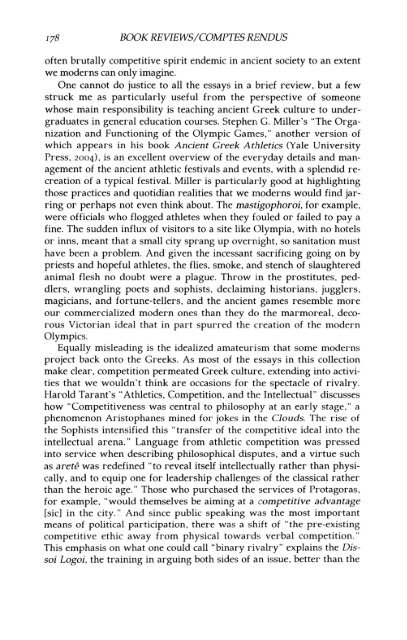MOUSEION - Memorial University of Newfoundland
MOUSEION - Memorial University of Newfoundland
MOUSEION - Memorial University of Newfoundland
You also want an ePaper? Increase the reach of your titles
YUMPU automatically turns print PDFs into web optimized ePapers that Google loves.
BOOK REVIEWS/COMPTES RENDUS<br />
<strong>of</strong>ten brutally competitive spirit endemic in ancient society to an extent<br />
we moderns can only imagine.<br />
One cannot do justice to all the essays in a brief review. but a few<br />
struck me as particularly useful from the perspective <strong>of</strong> someone<br />
whose main responsibility is teaching ancient Greek culture to undergraduates<br />
in general education courses. Stephen G. Miller's "The Organization<br />
and Functioning <strong>of</strong> the Olympic Games." another version <strong>of</strong><br />
which appears in his book Ancient Greek Athletics (Yale <strong>University</strong><br />
Press. 2004). is an excellent overview <strong>of</strong> the everyday details and management<br />
<strong>of</strong> the ancient athletic festivals and events. with a splendid recreation<br />
<strong>of</strong> a typical festival. Miller is particularly good at highlighting<br />
those practices and quotidian realities that we moderns would find jarring<br />
or perhaps not even think about. The mastigophoroi. for example.<br />
were <strong>of</strong>ficials who flogged athletes when they fouled or failed to pay a<br />
fine. The sudden influx <strong>of</strong> visitors to a site like Olympia. with no hotels<br />
or inns. meant that a small city sprang up overnight. so sanitation must<br />
have been a problem. And given the incessant sacrificing going on by<br />
priests and hopeful athletes. the flies. smoke. and stench <strong>of</strong> slaughtered<br />
animal flesh no doubt were a plague. Throw in the prostitutes. peddlers.<br />
wrangling poets and sophists. declaiming historians. jugglers.<br />
magicians. and fortune-tellers. and the ancient games resemble more<br />
our commercialized modern ones than they do the marmoreal. decorous<br />
Victorian ideal that in part spurred the creation <strong>of</strong> the modern<br />
Olympics.<br />
Equally misleading is the idealized amateurism that some moderns<br />
project back onto the Greeks. As most <strong>of</strong> the essays in this collection<br />
make clear. competition permeated Greek culture. extending into activities<br />
that we wouldn't think are occasions for the spectacle <strong>of</strong> rivalry.<br />
Harold Tarant's "Athletics. Competition. and the Intellectual" discusses<br />
how "Competitiveness was central to philosophy at an early stage," a<br />
phenomenon Aristophanes mined for jokes in the Clouds. The rise <strong>of</strong><br />
the Sophists intensified this "transfer <strong>of</strong> the competitive ideal into the<br />
intellectual arena." Language from athletic competition was pressed<br />
into service when describing philosophical disputes. and a virtue such<br />
as arete was redefined "to reveal itself intellectually rather than physically.<br />
and to equip one for leadership challenges <strong>of</strong> the classical rather<br />
than the heroic age." Those who purchased the services <strong>of</strong> Protagoras.<br />
for example, "would themselves be aiming at a competitive advantage<br />
[sic] in the city." And since public speaking was the most important<br />
means <strong>of</strong> political participation, there was a shift <strong>of</strong> "the pre-existing<br />
competitive ethic away from physical towards verbal competition."<br />
This emphasis on what one could call "binary rivalry" explains the Dissoi<br />
Logoi. the training in arguing both sides <strong>of</strong> an issue. better than the

















